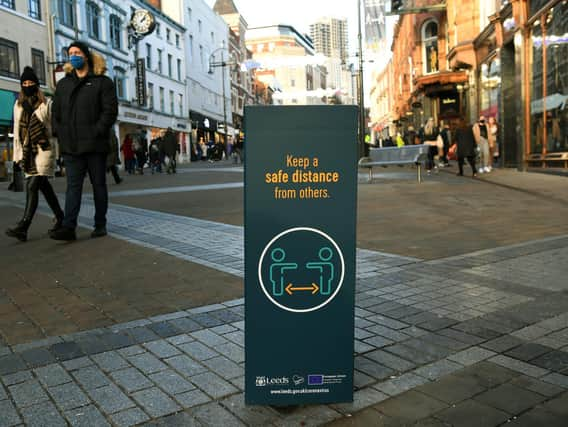Leeds daily Covid infection rate shows little progress as adviser warns annual vaccines may be needed to keep up with virus variants


On Saturday January 23, the Covid infection rate in Leeds was published as 285.3 cases per 100,000 people, which is the same as it was on January 21 despite an upward blip in between.
The rate on the day in between, January 22, was 287.7 cases per 100,000 people with a positivity rate of 11.9 per cent which shows the infection rate has remained relatively stable over the past three days.
Advertisement
Hide AdAdvertisement
Hide AdThe CEO of Leeds Council, Tom Riordan, tweeted on January 23: "Leeds case rate down slightly (from 287.7) to 285.3 per 100k - back to the same rate as Thursday.
"Hope you’re enjoying your weekend and keeping your distance!"
The rate on January 21 was a drop from January 20 when the rate was at 291.2 cases per 100,000 people, but Mr Riordan said that despite "good progress" the case rate is still "relatively high" and "pace of reduction is slowing".
Advertisement
Hide AdAdvertisement
Hide AdHe added that while the vaccine roll out is "going well", we "can't drop our guard".
On January 22, Tom Riordan tweeted: "Leeds case rate has edged up a little to 287.7 per 100k and positivity to 11.9%.
"Although the overall trend is still down, we need to keep staying in and keeping our distance.
"This awful virus doesn’t let up, so let’s keep at it."
Advertisement
Hide AdAdvertisement
Hide AdThis followed his tweet on January 21: "Leeds case rate down further to 285.3 per 100k (from 291.2), which is good progress.
"This is still a relatively high case rate & pace of reduction is slowing though, so we need to continue staying in & keeping our distance.
"Vaccine roll out going well but we can’t drop our guard."
On January 19, the infection rate in Leeds was recorded as 294.4 cases per 100,000 people which was a more significant drop from 318.4 cases per 100,000 people just the day before on January 18.
Advertisement
Hide AdAdvertisement
Hide AdOn January 19 also, the rate was 11 per cent down from seven days prior with the positivity rate stable at 11.6 per cent.
January 18's case rate was a small increase from 317.2 per 100,000 people on January 17, which was again an increase on the 310 cases per 100,000 people recorded on January 16.
The over 60s rate was also up to 244 cases per 100,000 people on January 17.
The Covid infection rate fell for the first time since the start of the third national lockdown on January 11.
Advertisement
Hide AdAdvertisement
Hide AdCoronavirus is now mutating “so rapidly” across the world that annual vaccinations may be needed to keep up with new variants of the virus, a top medical adviser has said.
It comes as Health Secretary Matt Hancock revealed there were 77 known cases of the South African variant in the UK and nine of the Brazilian variant.
Professor Anthony Harnden, deputy chair of the Joint Committee on Vaccination and Immunisation (JCVI), said that although foreign strains were “a real worry” the public should be reassured by the strength of vaccine technology.
Advertisement
Hide AdAdvertisement
Hide AdSpeaking on Sky News’ Sophy Ridge On Sunday he said: “I think we have to get used to this.
“We are living in a world where coronavirus is so prevalent and rapidly mutating there are going to be new variants that pop up in all sorts of different countries.
“We may well be in a situation where we have to have an annual coronavirus vaccine much like we do with the flu vaccine, but the public should be reassured that these technologies are relatively easy to edit and tweak, so once we find strains that are predominant, the vaccines can be altered.”
Earlier, Mr Hancock told the programme that work was being done with international counterparts to analyse the efficacy of the vaccine on foreign variants, but added he was more worried about further mutant strains that “had not been spotted”.
Advertisement
Hide AdAdvertisement
Hide Ad“There’s probably (variants) elsewhere that simply haven’t been picked up because the country doesn’t have that genomic sequencing service,” he said.
Mr Hancock said that tests were ongoing at Porton Down and in South Africa, adding that he wanted to see the UK’s genomic sequencing capability “made available across the world” so that emerging variants could be caught.
He said: “In the meantime we’ve got to have a precautionary principle… so we’ve introduced pre-departure testing and we’ve also introduced checks on everybody to check that that has happened.
“It is absolutely vital that we protect this country from a variant that is not as well dealt with by the vaccine.
“We cannot risk the progress we have made.”
Advertisement
Hide AdAdvertisement
Hide AdThe Government’s chief scientific adviser Sir Patrick Vallance previously said there was “no evidence that the South African or Brazilian variants” were more transmissible than the new UK strain.
But he said: “It is the case that both the South African and Brazilian identified variants have more differences in shape which might mean they are recognised differently by antibodies.”
“I think it is too early to know the effect that will have on the vaccination in people and it is worth remembering that the response of the vaccine is very, very high antibody levels, so they may overcome some of this.”
Comment Guidelines
National World encourages reader discussion on our stories. User feedback, insights and back-and-forth exchanges add a rich layer of context to reporting. Please review our Community Guidelines before commenting.